- Home
- Julia London
Highlander Unbound Page 2
Highlander Unbound Read online
Page 2
That was Payton Douglas he saw below, parrying his own shadow. Liam rolled his eyes—there wasn’t a Scot around Loch Chon who didn’t think he could be a soldier. But it took more than a wish. It took strength and cunning and courage. He would know, naturally—he had worked his way up through the ranks of the Highland Regiments over the last ten years, had achieved the vaulted status of captain, and had earned not one, but four medals of honor for heroic feats in the Peninsular Wars and at Waterloo. Yes, he knew a thing or two about soldiering, and in his estimation there weren’t many men who had the character for it.
This was precisely what he intended to demonstrate to Payton Douglas.
It was no secret around Loch Chon that there was no love lost between the Douglases and the Lockharts; it was a distrust that went back centuries. Just what, exactly, had happened between them, Liam didn’t know. He only knew that Payton was a Douglas. Nonetheless, he couldn’t help but admire him—he was a capable man, prosperous in hard times…but not so admirable that Liam would give him as much as an inch.
Aye, he’d just have a look at what Douglas had beneath that fancy coat he wore. With a low chuckle of glee, Liam turned from the window, walked to where the plaid was draped, and proceeded to dress.
As he waited for Liam (what full-grown man could sleep so late in the bloody day?), Payton amused himself by fencing with his shadow on the old bailey wall. He hadn’t a clue how to go about it, as he had never had the luxury of fencing lessons. But he had seen a few duels and was rather convinced it really wasn’t so difficult. He thrust forward, withdrew, and thrust again, moving his way down the massive stone wall. But he quickly was bored with that and amused himself further by imagining Lockharts were attacking him from all angles. He spun around, jabbed his sword in the air, then spun around again, prepared to lunge, but with a small exclamation of surprise, he stumbled backward, knocking up against the wall and dropping his old dull sword.
“Christ Jesus, Mared, ye could startle a man clear out of his wits!” he exclaimed hotly as he tried to catch his breath.
Having appeared from nowhere, Liam’s younger sister shrugged insouciantly, flipped the long tail of her braid over her shoulder, and adjusted the heavy basket she held at her hip. “Ye should look where ye point that thing.”
Oh, how very helpful. Hands on hips, Payton glared down at Mared. Fat lot of good it did—she hardly seemed to notice. This one had to be the most exasperating of all the bloody Lockharts, which was in and of itself a rather remarkable accomplishment, since they were the most exasperating group of human beings he had ever known.
Mared’s dark green gaze flicked to where his sword lay on the ground. “One canna help but wince when a man is foiled by a stone wall, can one?” she drawled.
Oh, aye, she was exasperating, maddeningly so, and Payton wished to high heaven she weren’t so bloody beautiful. But in that gown of emerald that matched the deep color of her eyes, she was, in a word, bewitching. The emphasis, of course, being on witch. He leaned over, snatched up his sword, and proceeded to knock the dirt from the handle. “Ye’ve a tongue as sharp as a serpent, Mared,” he said, looking up from the sword’s handle, “but damn me if ye donna look as bonny as a clear summer day.”
With a snort, Mared rolled her eyes. “There’s no point to yer flattery, Douglas.”
“Should beauty no’ be admired, then?”
Mared’s eyes narrowed; she reached into the large basket she held, withdrew a bramble berry, and popped it into her mouth. “Ye must take me for a featherbrain,” she said, nonchalantly chewing the berry. “Ye donna admire beauty, ye admire land, that’s all.” She helped herself to another berry. “And ye ask after the Lockhart lands as if they were barren.”
Ah-ha! So she had heard of his inquiries as to the acreage dedicated to cattle on Lockhart land, inquiries that had been made discreetly in Aberfoyle. How she had discovered it, he could only guess, but he’d wager a month’s income that it had something to do with those green eyes of hers. “Ach, yer a naïve lass,” he said, with a dismissive flick of his wrist. “Ye confuse a man’s appreciation with yer foolish pride.”
“Foolish pride?” She grunted her opinion of that sentiment and ate another berry. “And ye confuse ambition with centuries of history, Douglas.”
Now it was Payton’s turn to snort disdainfully, and he pointed the tip of his sword to the ground where her scuffed black leather boots peeked out beneath her gown. “Foolish and stubborn, that is what ye are, Mared Lockhart. Will ye deny, then, that the Douglas and Lockhart lands, if they were one, would prosper more than when they are apart?”
“Diah, ye must have lost yer mind! Why would a Lockhart ever join with a Douglas?”
“So that he…or she, as the unlikely case may be…might double the estate profits by giving wider range to the sheep. That’s why.”
Mared stilled. Blinked. “I think ye have lost yer bloody mind!” she exclaimed, and suddenly burst out laughing. “Honestly, Douglas, do ye truly think we’d trade our coos for sheep?”
Payton glowered at her. Beauty or not, she was as thick-skulled as every Lockhart he had ever known. “Ach, ye’re a foolish lot, ye Lockharts! Ye willna face the truth, willna admit ye are drowning in debt and that yer cattle willna bring what ye need to survive! Sheep, Mared! They need less land and can traverse the terrain, whereas yer bloody coos devour what grass there is by midsummer. And everyone around Loch Chon knows that without the rents from yer tenants, ye canna keep yer head above water.”
Mared’s eyes sparked with fury. She abruptly adjusted the basket she was holding and wagged a slender finger at him. “Ye willna speak to me thus, Douglas! And ye will never put yer dirty hands on Lockhart land!”
“Mared, leannan, let the poor bastard be!”
Mared and Payton both turned as Liam strode purposefully into the old bailey, his plaid swinging around his knees, a thick leather belt holding the pristine white shirt he had tucked into the folds. Payton could not help but smile—Liam Lockhart held fast and strong to tradition and honor, and wore his Scottish pride like a bloody badge. He truly admired his loyalty. And he envied Liam’s life thus far—on more than one occasion Payton wished he had gone off to experience life as Liam had done instead of attending the college as his father had insisted.
Liam stopped several yards in front of Payton and Mared, braced himself on his sturdy legs, and withdrew his sword from its scabbard. He held it as if it weighed nothing, point down, and silently perused Payton. After a moment, he gave a sly smile to Mared. “Best remove yerself from harm, lass,” he said casually. “Douglas here would like a wee lesson in swordplay. Am I right, Douglas?”
“If ye’d be of a mind,” Payton answered amicably.
“Ach,” Mared muttered, “what foolishness.” But she did as Liam suggested, walking to a crumbling old bench along the stone wall. To Payton’s dismay, she put her basket aside and sat herself down, as if she intended to watch the lesson.
“So ye desire a lesson,” Liam said again, slowly lifting the tip of his sword and drawing Payton’s attention away from Mared.
“Aye,” he nodded. “I’ve heard there’s none better with a saber than Liam of Lockhart.”
Liam snorted, lifted his sword. “’Tis true—I am the best. No man proved better.” He took a step, then another, slowly circling as Payton stood patiently, letting the captain have his moment. Liam came to a halt in front of him, and touched the button of Payton’s waistcoat with the tip of his sword. “Have ye ever fought a man sword to sword?”
“No.”
Liam grinned. “I thought as much, or ye’d know to remove yer coat. Ye canna fight all trussed up like a Christmas goose.”
Payton gave him a thin smile, thrust off his coat, and, for good measure, his waistcoat, too, tossing them onto the bench where Mared sat. She smiled wickedly, as if she hoped to see him sliced to ribbons. Payton wasn’t entirely sure she wouldn’t be obliged. He turned to Liam. “Let’s have at it then, shall we?�
�
A broad, predatory smile spread across Liam’s lips. “En garde,” he said quietly, and instantly moved one leg back, settling on it, while he held the other out from his body, bent at the knee.
Payton lifted his sword, mimicking him, but Liam groaned, rolled his eyes, and touched his sword to Payton’s. “What are ye doing then, Douglas? Put yer hand on yer hip there, and lift yer sword…aye, that’s how ’tis done. Ye’ll want to sweep aside or force mine down, do ye see?” he asked, demonstrating. Payton nodded that he did, and listened intently as Liam went on to explain how to lunge in attack, recover, and lunge again, attacking head, flank, and chest. “The blade precedes the body—it should land on yer target before yer foot hits the ground. Do ye see, then?”
“Aye,” Payton grunted.
They practiced lunging, legs bent, and recovering to the en garde position. Then Liam showed him how to parry, to defend himself in the face of attack, to cross-step, launch an attack, and cross-step again. His technique was, Payton thought, amazingly delicate for a man so large. He felt thick and awkward in comparison, not at all graceful like Liam.
“Aye, ye’ve got the feel for it,” Liam said, nodding, after they had shadow-fenced along the old bailey wall.
“So let’s see how ye be in combat,” he said, and startled Payton with a sudden lunge forward that left the tip of his saber resting on Payton’s belt.
He glanced up at Liam, smiled crookedly. “Ye wouldna be trying to slice off me drawers, now would ye?”
Liam laughed low. “Get yer sword up, man!” he warned Payton, and thrust again, slicing cleanly through the billowing sleeve of Payton’s shirt. Suddenly, they were moving, Payton retreating, lumbering backward, desperately trying to defend himself without falling. “Ach, did ye learn nothing? Heel to toe, heel to toe!” Liam shouted at him, but Payton unexpectedly collided hard with a wall and dropped his sword. Liam thrust the tip of his saber to Payton’s neck. “Tsk-tsk,” he said, shaking his head. “Pity, this. I have ye in death’s grip.”
Payton’s chest was heaving. He blinked against the sun glinting off Liam’s sword, thought about Mared watching him take this beating, and slowly slid down the wall to his haunches, groping for his sword as Liam calmly kept him penned. He nodded, tried to catch his breath. “I see why they say ye are the best, Lockhart.”
“Aye.” Liam grinned. “Ye’ve too much in the arm; no’ enough in yer wrist,” he said. “And ye must remember to keep yer eye on the best angle to strike.”
His sword in hand, Payton nodded, slowly pushed himself up to his feet. “No’ enough in the wrist,” he repeated. “Like this, then?” he asked, and before Liam could respond, Payton lunged, miraculously catching him off-guard. He lunged again, heel to toe, heel to toe, thrusting wildly at the head, chest, and flank, forcing Liam to retreat.
The two danced to the middle of the old bailey so fast that Payton couldn’t even say how it had happened—but he was still in command, still directing the play. The rapid sound of steel on steel sliced through the morning air, setting his teeth on edge. Liam seemed to be back on his heels, and Payton desperately fought to keep him there, jabbing forward, again and again, until he had forced Liam up against the wall, swept his saber aside, and penned him at the throat with his arm.
But instead of being angry, Liam laughed. “Ah, so ye did learn a thing or two,” he said, and abruptly and fluidly pushed and slipped out of Payton’s hold, spun around, and knocked Payton back with the force of his saber across his chest. Payton went down with a great thunk, landing square on his back and with the wind knocked from his lungs. Liam was instantly on top of him, a boot on his abdomen, the tip of the saber at his throat, and his free hand held high in the air in triumph.
For a brief moment, Payton believed Liam would kill him. Until Liam threw his head back and laughed, and offered him a hand up.
And somewhere on the edge of his consciousness, Payton heard Mared exclaim in disappointment, “Ach, for the love of God!”
Carson Lockhart arrived at Talla Dileas from Aberfoyle late that afternoon, kissed his wife, Aila, fully on the lips, and motioned for Dudley, his longtime butler, to pour a dram of whiskey so that he might wash the dirt of the road from his throat.
Aila put aside her mending and watched her husband, quietly assessing him. She had been married to the man for thirty-eight years and could read him like a book. And judging by his dejected expression, she could see that things had not gone well in Aberfoyle. She waited until he was seated comfortably, had drunk his first whiskey and had his second in hand before she spoke. “Well, Carson. What news have ye brought us, then?”
Her husband grimaced at the question, shoved fingers through a thick shock of gray hair. “’Tis no’ good,” he admitted. “They willna lend us another farthing if me very life depended on it.”
That news was hardly unexpected, but they had hoped for better. The old Lockhart estate had grown increasingly hard to maintain in an era of new farming techniques and growing industry, and the family had long since overextended their welcome at the Royal Bank of Scotland. As their debts had mounted, they had come to the conclusion that they could not support so many tenants. The family had agreed they would buy out the crofters who had farmed Lockhart soil for generations—they would offer a fair price and would not, as other lairds had done, push them from their homes. Theirs was a noble intent, but that intent was quietly bankrupting the family.
Aila looked thoughtfully at the thick-paned windows that bordered a wall of what had once been the old castle’s great hall. She wondered if her family would laugh at the idea she had been nurturing the last two weeks. It was a rather ridiculous plan, she’d be the first to admit, but in light of their dire financial situation, it seemed at least worth discussion. They had to do something soon before they lost Talla Dileas and were forced to join the thousands of Highlanders looking for work in Glasgow. The very thought made her shudder; she imagined such an event would kill Carson. She glanced at her husband, whose eyelids were sliding to half-mast, and came to her feet, moving to the great wing-backed chair on which he sat. She ran her hand over the top of his head, leaned down and kissed his forehead. “Shut yer eyes, love,” she murmured, taking the whiskey glass from his hand. “We’ll speak of it later.”
One could hardly call it supper by their former standard of living.
It consisted of bannocks, or oat cakes, a rather spindly grouse, a bowl of bramble berries, and black bun cake. “We’ve no food to speak of, milady,” Dudley’s wife, the family cook, had complained to Aila earlier in the week. “I’ve naugh’ but oats.”
“Then we’ll eat bannocks,” Aila had said sharply, frustrated with their increasing poverty, and then had sent Liam into the forest to find game. The bramble berries were thanks to Mared’s diligent efforts to climb to the top of Din Footh to pick them, and the black bun cake courtesy of some rotting fruit. It was fare they could expect until the first of the month when the rents came in—what paltry few were left, anyway.
When the family sat down to supper, they politely ignored the sparse menu, and sipped cautiously from a dwindling supply of wine.
Aila looked down the table, quietly admiring her children. Each of the three was educated and well traveled, something she and Carson had managed to accomplish before things got so bad.
There was Liam, big and strong, the proud soldier. He was Aila’s restless child, the one who had always chafed at the lack of activity in and around Loch Chon. As a boy he had been the most trouble, getting into so many fights that his face was permanently battered. And now this jagged scar, gained at the Battle of Waterloo, new enough that it was still quite garishly red. Even now, at the age of five and thirty, having been home from the Continent only a month, Liam’s restlessness rattled the old house—he had, in this short time, engaged in two fistfights, taught three men how to fence, and had dragged a protesting Griffin to hunt deep in the forest at least twice a week—to keep his soldier skills honed, he said.
&
nbsp; Then there was Griffin, her middle child, who, like Aila’s father, whom he so closely resembled, looked so handsome in all his finery and was far more interested in social events than hunting or fighting. Unlike Liam, Griffin preferred the riches of life and was ambitious toward that end, wanting a stature in society Aila feared the family would never achieve. But it was Griffin who kept them thinking, kept them looking forward—he was constantly urging his father to consider new risk-taking ventures that would make the estate more profitable. Given their present circumstances, Aila could not argue with his point of view. Carson, on the other hand, could and did. God love him, but her husband was tucked comfortably in bed with the old way of thinking and was not ready to rise up with a new day.
And then there was Mared, her darling, beautiful Mared, marked by a ridiculous ancient curse that she’d never marry until she faced the Devil himself. Mared hardly believed in such nonsense—certainly none of the family did—but many of the locals in and around Loch Chon did. They regarded her as something of a curiosity, whispered behind their hands about her. Long ago, when she was just a wee lass, Mared had abandoned any pretense of believing she could overcome the wretched curse and lived as she desired, convinced she had nothing to lose, but sadly, just as convinced she had nothing to gain.
Aila would do anything for the four people seated at her table. Anything. Even break the law, for she was certain the English would perceive her plan to be unlawful, even if it was right.
Liam happily devoured his supper, oblivious to the lack of variety, regaling them with tales of the fencing lesson he had given Payton Douglas. “He gave me quite a fight, I’ll hand him that,” he said. “With a bit of proper tutelage, he’d make a decent soldier, he would.”
Mared snorted. “Ye speak as if he is our friend, Liam,” she chided her older brother. “Have ye forgotten? He is a Douglas! And he wasna so promising as ye say.”

 A Royal Kiss & Tell
A Royal Kiss & Tell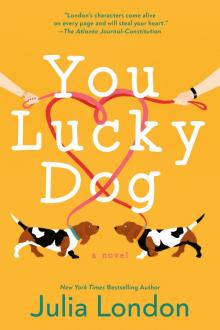 You Lucky Dog
You Lucky Dog The Devil in the Saddle
The Devil in the Saddle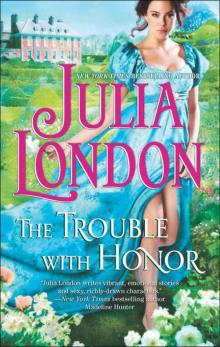 The Trouble with Honor
The Trouble with Honor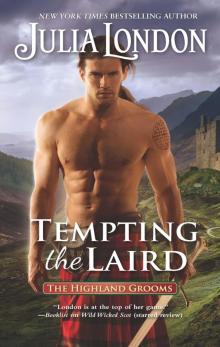 Tempting the Laird
Tempting the Laird The Secret Lover
The Secret Lover A Light at Winter’s End
A Light at Winter’s End The Charmer in Chaps
The Charmer in Chaps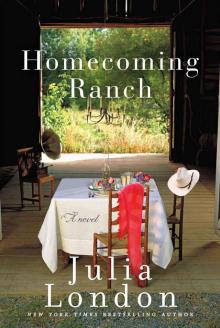 Homecoming Ranch
Homecoming Ranch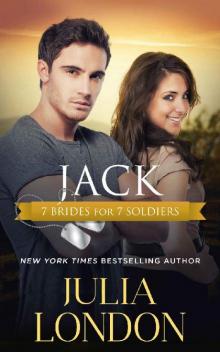 Jack (7 Brides for 7 Soldiers Book 5)
Jack (7 Brides for 7 Soldiers Book 5) A Courtesan's Scandal
A Courtesan's Scandal Hard-Hearted Highlander--A Historical Romance Novel
Hard-Hearted Highlander--A Historical Romance Novel The Complete Novels of the Lear Sister Trilogy
The Complete Novels of the Lear Sister Trilogy The Last Debutante
The Last Debutante Suddenly Single (A Lake Haven Novel Book 4)
Suddenly Single (A Lake Haven Novel Book 4) Seduced by a Scot
Seduced by a Scot Highlander Unbound
Highlander Unbound Suddenly Dating (A Lake Haven Novel Book 2)
Suddenly Dating (A Lake Haven Novel Book 2)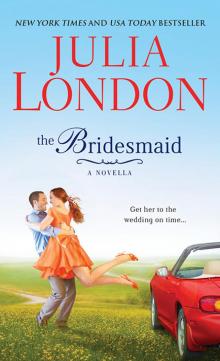 The Bridesmaid
The Bridesmaid The Seduction of Lady X
The Seduction of Lady X One Mad Night
One Mad Night Extreme Bachelor
Extreme Bachelor The Scoundrel and the Debutante
The Scoundrel and the Debutante The Revenge of Lord Eberlin
The Revenge of Lord Eberlin American Diva
American Diva The Lovers: A Ghost Story
The Lovers: A Ghost Story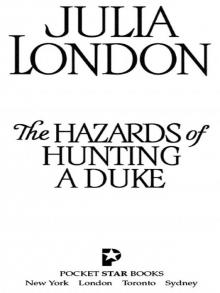 The Hazards of Hunting a Duke
The Hazards of Hunting a Duke Return to Homecoming Ranch (Pine River)
Return to Homecoming Ranch (Pine River)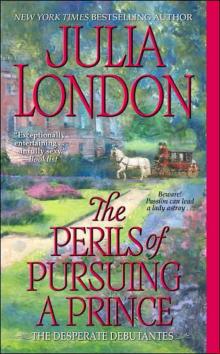 The Perils of Pursuing a Prince
The Perils of Pursuing a Prince Highlander in Love
Highlander in Love The Devil Takes a Bride
The Devil Takes a Bride Devil in Tartan
Devil in Tartan Wild Wicked Scot
Wild Wicked Scot Snowy Night with a Highlander
Snowy Night with a Highlander One Season of Sunshine
One Season of Sunshine Summer of Two Wishes
Summer of Two Wishes All I Need Is You aka Wedding Survivor
All I Need Is You aka Wedding Survivor Sinful Scottish Laird--A Historical Romance Novel
Sinful Scottish Laird--A Historical Romance Novel Suddenly Engaged (A Lake Haven Novel Book 3)
Suddenly Engaged (A Lake Haven Novel Book 3)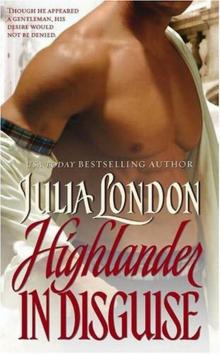 Highlander in Disguise
Highlander in Disguise Suddenly in Love (Lake Haven#1)
Suddenly in Love (Lake Haven#1)